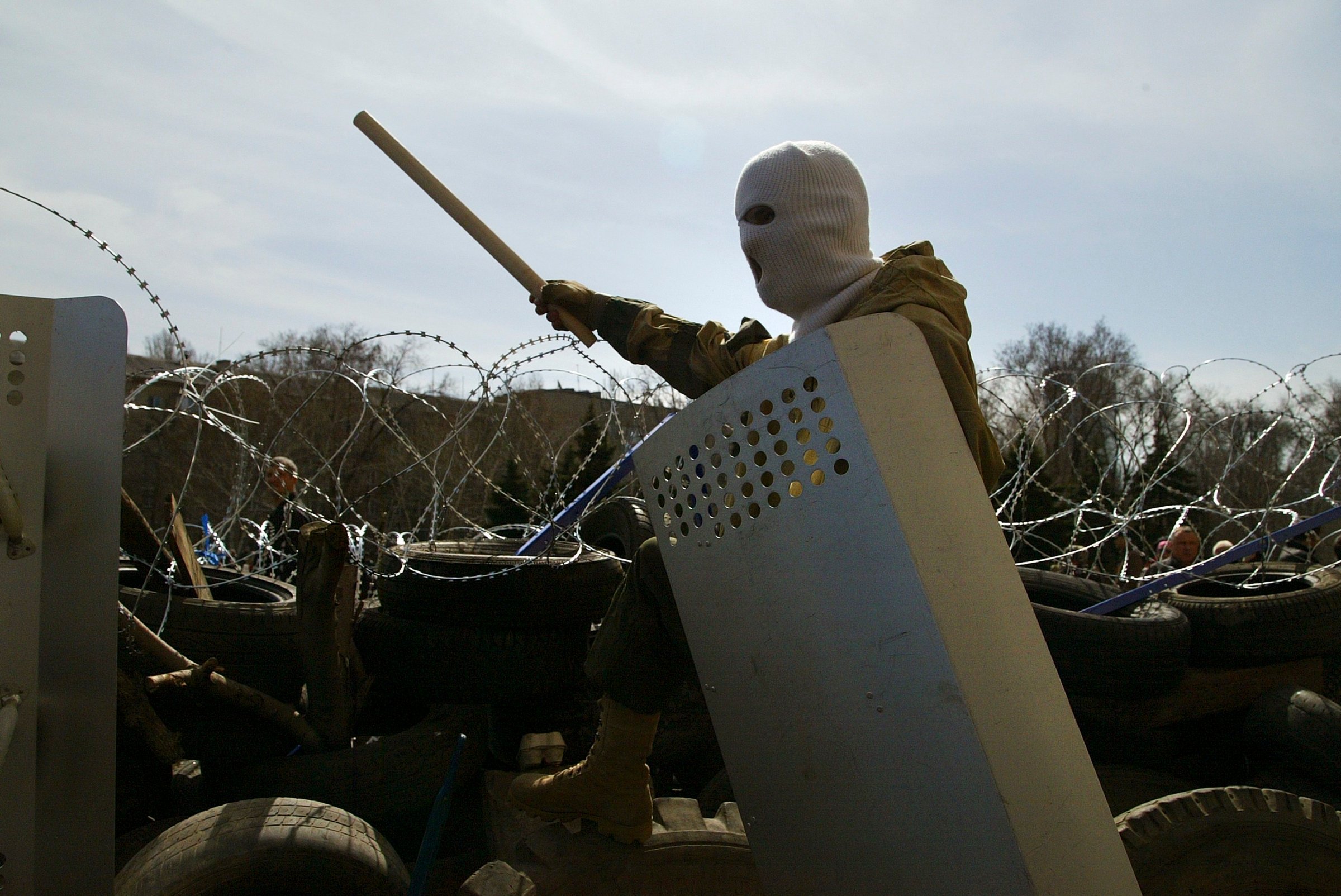
Ukraine’s Showdown With Russia Shifts to Its Eastern Border
History doesn’t wait long to repeat itself. In the first week of April, pro-Russian separatists seized government buildings in eastern Ukraine, barricaded themselves inside and appealed to Russia to protect them. They are following the script that last month ended in Russia’s annexation of Crimea. Only this time, the stakes are much higher.
Eastern Ukraine is several times larger, wealthier and better defended than Crimea. Moreover, Russia won’t have the advantage of surprise. In late February, its occupation of Crimea exploited the chaotic power vacuum left by Ukraine’s revolution. Now the new government in Kiev is ready for a fight. Thousands of troops have been moved to guard its eastern borders, and police have arrested scores of separatists in what they have termed a counterterrorism operation.
But that operation may simply give Russia an excuse to intervene, on the pretext of taking eastern Ukraine “under its protection,” as it has threatened to do for months. On April 8, Moscow even claimed Kiev was sending American mercenaries to suppress unrest in the region, thus setting up a useful pretext for a possible invasion.
That would be enough to spark a full-scale war with Ukraine, likely to last longer and be bloodier than Russia’s 2008 incursion into Georgia. Worryingly for the government in Kiev, the carnage may be worth the prize to Russian President Vladimir Putin. It would mean seizing vast reserves of coal and metals, and the Russian public would likely support him. In early March, a national poll found 65% of Russians believe that eastern Ukraine is “in essence” Russia’s territory.
As Putin also understands, no Western armies are likely to come to Ukraine’s rescue. So will the Russian leader make another land grab? The risks this time are far greater than they were in Crimea–but so are the potential gains for the Kremlin. Ukraine’s fate now depends on how Putin weighs them against each other.
DATA
RELIGIOUS DIVERSITY
The Pew Research Center ranked 232 countries and territories based on their religious makeup. Here’s how some placed, from most to least diverse:
1 Singapore
25 France
68 U.S.
176 Peru
Three Essential Facts About India’s election
With some 814 million people eligible to vote, the world’s largest democratic exercise kicked off on April 7 as polling began in India’s five-week-long national election.
RISING OPPOSITION
The Hindu nationalist Bharatiya Janata Party (BJP), whose candidate for Prime Minister is Narendra Modi, a controversial politician from the state of Gujarat, is set to gain from an economic slowdown under the ruling Congress Party–led coalition, now headed by Congress vice president Rahul Gandhi.
UNCERTAIN RESULT
Although the BJP is likely to do well, it may not win enough parliamentary seats to form a government on its own. Another coalition administration remains a distinct possibility, and regional parties could hold sway over key posts and policies.
YOUNG ELECTORATE
Nearly half of Indians are under the age of 25, so the country’s youth will be instrumental in deciding who wins.
Take That, Taliban!
AFGHANISTAN
Election workers sort ballots at a polling station in Kabul. Roughly 58% of registered voters, or about 7 million people, voted in presidential elections on April 5, up from about 38% in the previous poll in 2009. Despite the threat of violence from the Taliban, the vote to pick a successor to President Hamid Karzai was largely peaceful and came as most international troops prepare to leave the country. Preliminary results are due on April 24.
WORLD
$44,000,000
Estimated cost of the hunt for Malaysia Airlines Flight 370 since it disappeared on March 8, according to Reuters
Roundup
Unusual diplomatic gifts
Britain’s Queen Elizabeth II presented Pope Francis with a basket of culinary delights from her estates, including eggs and scotch whisky, during a recent visit to the Vatican. But she’s not the first world leader to offer peculiar gifts.
Puppy
Bulgarian Premier Boyko Borisov presented Vladimir Putin, then Russia’s Prime Minister, with a puppy to mark the signing of a gas deal in 2010
Wine cooler
In 1972, French President Georges Pompidou gave the British Queen a wine cooler shaped like a giant grasshopper
Insurance
The head of Australia’s Northern Territory took out a $51,000 crocodile-insurance policy for Barack Obama and gave it to the U.S. President during Obama’s 2011 visit to the state
Chew toy
In 2011, U.K. Prime Minister David Cameron gave President Obama a toy bone decorated with the British flag for his dog Bo
Camel
Mali gave French President François Hollande a baby camel last year to thank him for France’s help in fighting Islamist rebels
CENTRAL AFRICAN REPUBLIC
‘There is a hole in the heart of Africa.’
BAN KI-MOON, U.N. Secretary-General, during a visit to the conflict-ridden nation; he called for international action to end the sectarian violence that has claimed over 2,000 lives since December
Trending In
+
DIPLOMACY
Venezuela’s main opposition group agreed to Vatican-mediated talks with President Maduro
RESCUE
Twelve workers were pulled free after spending more than 80 hours trapped in a collapsed train tunnel in China’s Jilin province
CRIME
Pakistani police charged a 9-month-old, his father and his grandfather with attempted murder after an officer claimed the family had beaten him up
DISASTER
The U.N. warned that a looming drought in Syria could put up to 6.5 million people at risk of a food shortage amid the ongoing conflict
–
More Must-Reads from TIME
- Donald Trump Is TIME's 2024 Person of the Year
- Why We Chose Trump as Person of the Year
- Is Intermittent Fasting Good or Bad for You?
- The 100 Must-Read Books of 2024
- The 20 Best Christmas TV Episodes
- Column: If Optimism Feels Ridiculous Now, Try Hope
- The Future of Climate Action Is Trade Policy
- Merle Bombardieri Is Helping People Make the Baby Decision
Contact us at letters@time.com